By DAN TOMASELLO
LYNNFIELD — Kindness and inclusion were the two central themes outlined in the Equity Report, Superintendent Kristen Vogel said during the School Committee’s Dec. 21 meeting.
Vogel recalled that the school system hired The Equity Process last spring to conduct an equity audit for the district. The audit began in July and was finalized earlier this month.
Teaching and Learning Director Kevin Cyr said The Equity Process “customized the report for Lynnfield Public Schools and the school community.”
“The goal is to have an inclusive school community,” said Cyr.
Vogel agreed.
“We want to make sure all of our students are loved, seen, heard, valued and engaged when learning,” said Vogel. “This report gives us an unbiased perspective to make sure we are all doing that for all of our students. All means all.”
The report did not mention or recommend that the district implement critical race theory or The New York Times’ 1619 Project. The school system is not teaching either initiative in classrooms.
In order to undertake the audit, Cyr said The Equity Process reviewed the district’s policies and procedures. The consultants also conducted one-on-one interviews with school officials and educators, and administered a survey to faculty members. The consultants also spent a day conducting equity walks in the schools.
“We had a common rubric with the focal point being culturally responsive teaching,” said Cyr. “That really guided the work The Equity Process was looking for.”
School Committee Chairman Rich Sjoberg asked Cyr to give an overview of culturally responsive teaching.
Cyr said culturally responsive teaching is a pedagogy that recognizes the importance of including students’ cultural references in the classroom. He said it is connected to the district’s social-emotional learning initiatives, which were implemented several years ago.
“We want students to feel comfortable in the classroom, and there is a certain approach needed when it comes to teaching and learning,” said Cyr. “If teachers want students to feel comfortable and want to develop relationships with students, there are practices teachers need to use on a daily basis to ensure all of our students feel comfortable.”
Cyr said The Equity Process also held focus groups for students, faculty and community members.
“We put a premium on student voice in this district, and the students spoke thoughtfully about their place in this district and in this community,” said Cyr.
Vogel said kindness was a “common theme” highlighted in the Equity Report. She said The Equity Process commended all four schools for providing a welcoming environment for students and families.
“When we were engaged in the walkthroughs with The Equity Process, one of the comments that they made was if they had younger children, they would send them to the Lynnfield Public Schools in a second,” said Vogel.
Vogel also said the report complimented the school system for aligning instructional practices with state standards, being competency-based and being “experiential and developmentally appropriate.”
Recommendations
Moving forward, Vogel said The Equity Process highlighted several recommendations for the School Department to implement. She said the recommendations pertained to climate and culture, diversity, equity and inclusion (DEI), and curriculum.
Vogel said one of the climate recommendations involves incorporating a Lynnfield Kind initiative by updating the district’s mission statement. She said school officials will begin working on updating the mission statement this spring.
“Once that is done, The Equity Process recommended that it be aligned with the district strategy, school improvement plans and educator goals,” said Vogel.
School Committee member Kate DePrizio said kindness is frequently seen in all four schools. She is looking forward to students embracing the Lynnfield Kind mantra in the future.
School Committee Vice Chairwoman Stacy Dahlstedt concurred with DePrizio’s viewpoint.
“At the end of the day, Lynnfield Kind is already in Lynnfield,” said Dahlstedt. “Kindness and respect is visible in classrooms, hallways, playing fields, the stage and the greater community. I love that we are talking about Lynnfield Kind. All of this work is embedded in the word kindness. We just need to hone in on what it looks like in more detail.”
Sjoberg concurred with Dahlstedt and DePrizio’s sentiment.
“We are far from starting from ground zero here,” said Sjoberg. “The plan is to find the pockets where can kindness and inclusivity can meet.”
Vogel said The Equity Process also recommended that the school system’s handbooks be aligned in order to make sure families clearly understand the district’s policies and procedures. She noted that there is currently one handbook for each school.
“They each have their own code of conduct,” said Vogel. “The recommendation is to align them and move to one handbook for the district because the individual handbooks can be confusing for families.”
Under the DEI recommendations, Vogel said The Equity Process recommended that the school system continue to “build community in all of the schools.”
“We know how important that is and we will continue that work,” said Vogel.
Vogel also said The Equity Process recommended that the district ensure “all students are reflected in classroom libraries and classrooms.”
“They are and we need to continue to do so,” said Vogel. “There were some classrooms that did not reflect students with disabilities in some of the literature or on classroom walls. That is something we need to work on.”
Cyr said The Equity Process recommended that the district continue to provide professional development time to educators about inclusive school communities and teaching practices.
Vogel said the last DEI recommendation involved “embedding kindness and citizenship throughout the school community.”
Under the curriculum recommendations, Vogel said The Equity Process recommended that the district develop new ways for students with disabilities to enroll in challenging courses.
Vogel also said The Equity Process recommended the district increase authentic learning opportunities and partnerships for students. She said one way to accomplish that objective is expanding Lynnfield High School’s internship program.
The Equity Process also recommended that the district expand the high school’s Vision of the Graduate initiative that is currently being piloted at LHS this year (see separate story). Vogel said it will take time for the high school to fully implement the new graduation requirement and for the district to expand it to the other four schools.
Next steps
Vogel said school officials will begin working on updating the mission statement in order to reflect the Lynnfield Kind initiative this spring. She also said school officials be making sure all of the school handbooks are aligned.
The superintendent said the district will be looking to provide “authentic opportunities” for METCO students and families in the school community.
Vogel also said the School Committee will be updating certain policies in order to make them more student friendly.
School Committee member Jamie Hayman said there is “a lot of good content” in The Equity Process’ report. He encouraged parents and community members to read it.
Dahlstedt said the report included some recommendations that are “tangible while others are not.” She said school officials should develop checklists for the action items that will be implemented and review them later in order to see how they are progressing.
“The district is in a great place,” said Dahlstedt.
Sjoberg echoed Dahlstedt’s viewpoint.
“We are all know how great the Lynnfield School District is,” said Sjoberg. “The Lynnfield School District is a steady ship that provides students with a solid foundation for learning. We provide every opportunity for every student no matter what their path is. The report seeks have that ship go global.”





